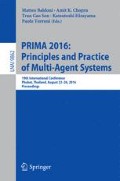Abstract
Intelligent software agents may significantly benefit from semantic reasoning. However, existing semantic reasoners are based on Description Logics, which cannot handle vague, incomplete, and unreliable knowledge. In this paper, we propose \(\mathcal {S}\textsf {DL}\text {-}\textsf {Lite}\) which extends \(\textsf {DL}\text {-}\textsf {Lite}_{{R}}\) with subjective opinions to represent uncertainty in knowledge. We directly incorporate trust into the reasoning so that the inconsistencies in the knowledge can be resolved based on trust evidence analysis. Therefore, the proposed logic can handle uncertain information from unreliable sources. We demonstrate how \(\mathcal {S}\textsf {DL}\text {-}\textsf {Lite}\) can be used for semantic fusion of uncertain information from unreliable sources and show that \(\mathcal {S}\textsf {DL}\text {-}\textsf {Lite}\) reasoner can estimate the ground truth with a minimal error.
Research was sponsored by the U.S. Army Research Laboratory and the U.K. Ministry of Defence and was accomplished under Agreement Numbers W911NF-06-3-0001 and W911NF-14-1-0199. The views and conclusions contained in this document are those of the author(s) and should not be interpreted as representing the official policies, either expressed or implied, of the U.S. Army Research Laboratory, the U.S. Government, the U.K. Ministry of Defence or the U.K. Government. The U.S. and U.K. Governments are authorized to reproduce and distribute reprints for Goverment purposes notwithstanding any copyright notation hereon. Dr. Şensoy thanks to the U.S. Army Research Laboratory for its support under grant W911NF-14-1-0199 and The Scientific and Technological Research Council of Turkey (TUBITAK) for its support under grant 113E238.
Access this chapter
Tax calculation will be finalised at checkout
Purchases are for personal use only
Notes
- 1.
Note that \( b_{x|z}, b_{z|y}, b_{y|x} > 0\) imply that \(b_{z|x} \ge b_{z|y} b_{y|x} > 0\) as explained in Sect. 3.1.
References
Artz, D., Gil, Y.: A survey of trust in computer science and the Semantic Web. Web Semant.: Sci. Serv. Agents World Wide Web 5(2), 58–71 (2007)
Baader, F., McGuiness, D.L., Nardi, D., Patel-Schneider, P.: Description Logic Handbook: Theory, Implementation and Applications. Cambridge University Press, Cambridge (2002)
Boyd, S., Vandenberghe, L.: Convex Optimization. Cambridge University Press, New York (2004)
Calvanese, D., Giacomo, G., Lembo, D., Lenzerini, M., Rosati, R.: Tractable reasoning and efficient query answering in description logics: the DL-lite family. J. Autom. Reason. 39(3), 385–429 (2007)
Golbeck, J., Halaschek-Wiener, C.: Trust-based revision for expressive web syndication. J. Logic Comput. 19(5), 771–790 (2009)
Gómez, S.A.: Reasoning with inconsistent possibilistic description logics ontologies with disjunctive assertions. J. Comput. Sci. Technol. 15 (2015)
Jøsang, A.: Subjective Logic. Springer, Heidelberg (2016)
Jøsang, A., Ismail, R.: The beta reputation system. In: Proceedings of the 15th Bled Electronic Commerce Conference e-Reality: Constructing the e-Economy, pp. 48–64 (2002)
Qi, G., Pan, J.Z., Ji, Q.: Extending description logics with uncertainty reasoning in possibilistic logic. In: Mellouli, K. (ed.) ECSQARU 2007. LNCS (LNAI), vol. 4724, pp. 828–839. Springer, Heidelberg (2007)
Sensoy, M., Fokoue, A., Pan, J.Z., Norman, T.J.: Reasoning about uncertain information and conflict resolution through trust revision. In: Proceedings of 12th International Joint Conference on Autonomous Agents and Multiagent Systems (AAMAS), pp. 837–844 (2013)
Shafer, G.: A Mathematical Theory of Evidence. Princeton University Press, Princeton (1976)
Author information
Authors and Affiliations
Corresponding author
Editor information
Editors and Affiliations
Rights and permissions
Copyright information
© 2016 Springer International Publishing Switzerland
About this paper
Cite this paper
Şensoy, M., Kaplan, L., de Mel, G. (2016). Semantic Reasoning with Uncertain Information from Unreliable Sources. In: Baldoni, M., Chopra, A., Son, T., Hirayama, K., Torroni, P. (eds) PRIMA 2016: Principles and Practice of Multi-Agent Systems. PRIMA 2016. Lecture Notes in Computer Science(), vol 9862. Springer, Cham. https://doi.org/10.1007/978-3-319-44832-9_6
Download citation
DOI: https://doi.org/10.1007/978-3-319-44832-9_6
Published:
Publisher Name: Springer, Cham
Print ISBN: 978-3-319-44831-2
Online ISBN: 978-3-319-44832-9
eBook Packages: Computer ScienceComputer Science (R0)

